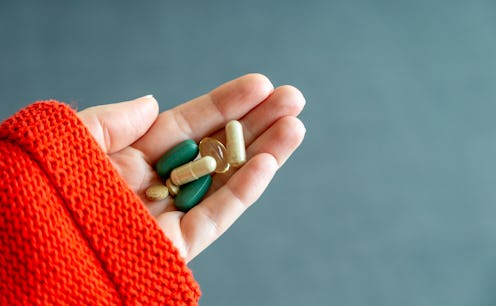
As more places institute social distancing guidelines to help “flatten the curve” of the COVID-19 pandemic, you might notice your social media feeds are overrun with ads for “immunity-boosting” supplements. From pills to powders to smoothie mix-ins, these products often come couched in language about “supporting” or “strengthening” your immune system, without directly referencing the public health crisis at the front of everyone’s minds. People everywhere are trying to keep themselves safe from contracting coronavirus, but experts say supplements aren’t likely to help.
“The only way a supplement could help prevent the spread of an infectious disease is if the supplement made you too sick to leave your home,” Dr. Juan Antonio Dumois, an infectious disease specialist at Johns Hopkins All Children’s Hospital, says.
The Immune System Is Complicated
Dumois says when it comes to understanding any claims being made about boosting immunity, first you need to know what “immunity” means.
The immune system helps keep infections and cancers under control, he explains; white blood cells are key to this process. Different kinds of white blood cells, made by your bone marrow, do different things to help keep your body healthy, according to the University of Rochester Medical Center: Some “sound the alarm” when infectious agents invade the body and kickstart its response, some work to produce antibodies to fight bacteria and viruses, and some break down bacteria directly.
Your bone marrow needs you to eat a balanced diet in order to turn amino acids into white blood cells, according to the Academy of Nutrition & Dietetics. Take someone who is deficient in vitamin B12 (a common issue for vegans) — supplementing with that specific vitamin helps prevent anemia, keeps blood and nerve cells healthy, and allows the body to produce DNA, which all in turn help your immune system. Generally speaking, though, most Americans are able to get all the vitamins and minerals they need from their food.
On top of vitamins, a few herbal ingredients commonly pop up in these supplements, each of which sorta-kinda does what it’s marketed to do. Studies have shown that elderberry extract, Shatavari root extract, Ashwagandha root extract, and Reishi mushrooms might have a positive effect on the immune system, but each study concludes that more testing needs to be done before these supplements should be recommended.
Just because some “supplements may have been shown to stimulate the activity of white blood cells in a test tube,” Dumois says, “does not mean they will make a sick person feel better.”
“Immune-Boosting” Doesn’t Really Mean Anything — Especially Not In The Context Of Coronavirus
While the Food and Drug Administration (FDA) doesn’t regulate the supplement industry the way it does prescription drugs, it does ban manufacturers of dietary supplements from marketing their products for the purpose of treating, diagnosing, preventing, or curing diseases. They do allow manufacturers to make claims about “supporting” or “strengthening” some process of the human body, like immunity.
You find those words all over the labels of these products. But as Dumois puts it, “immunity supporting,” “immunity boosting,” and immunity strengthening” are all phrases that “do not have a specific medical or scientific meaning.”
Because of the “extreme complexity of the human immune system,” Dumois points out that even in the case where, hypothetically, a supplement did kickstart your immune response, it might not be what’s best for the body: In severe cases of COVID-19, an aggressive immune response against the virus is the cause of some of the worst lung damage, Dumois says.
According to the CDC, the immune response to COVID-19 is not yet understood. Scientists simply don’t know enough yet about how the virus operates, other than that it’s highly contagious. So the idea that a supplement with limited research may stop you from getting coronavirus is no more likely than assuming that, well, anything other than social distancing (or any forthcoming vaccine) will stop you from getting it.
“Since there have been no studies published about the benefits of any dietary supplement in the treatment of patients with COVID-19, you cannot assume or believe that any supplements that ‘boosts the immune system’ will make you better,” Dumois says.
This goes for both prevention and cure. Dr. Anthony Fauci, the Director of the National Institute of Allergy and Infectious Diseases (NIAID) at the National Institutes of Health (NIH), has repeatedly said there is no proven treatment for COVID-19 yet, says Dr. Ellen Foxman, an assistant professor of laboratory medicine and immunobiology at the Yale School of Medicine.
“That means [there is] no proven drug or medication or herbal supplement that treats this,” Foxman says. “If someone is claiming they have a magic pill, they don’t.”
Stay Healthy During The Coronavirus Outbreak By Being Healthy
The best things anyone can do to “boost” their immune system are common sense. “During times of stress, people put aside their normal healthy habits, like three meals a day and a good night’s sleep,” says Foxman. Sleeping and eating a balanced diet, as well as a little bit of exercise, can help you maintain your baseline health and make it easier for your body to fight off illnesses.
But no supplement can do what social distancing and best practices do to prevent or slow the spread of coronavirus infections. Dumois emphasizes washing your hands, not touching your face, and staying away from potentially sick people.
“If you don’t come across other people, you’re not going to get a virus from them,” Foxman says. “It sounds really dull and boring, but … staying home is really effective.”
Experts cited:
Dr. Juan Antonio Dumois, an infectious disease specialist at Johns Hopkins All Children’s Hospital
Dr. Ellen Foxman, an assistant professor of laboratory medicine and immunobiology at the Yale School of Medicine